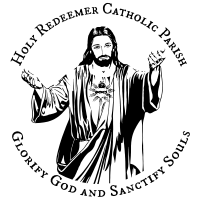The Precepts of the Catholic Faith, Part 5
The Fifth of a Seven Part Series
You can read part one here, part two here, part three here, and part four here.
Jesus Christ today, yesterday, and forever.
This week we continue our series on the Precepts of the Catholic Church: “pre” meaning “before”, and “cept” meaning “life” – before there can be full life in God, these seven laws must be observed. Failure to live them out would constitute a mortal sin: when one has knowledge of them, and acts without undue coercion to disregard them. “The obligatory character of these positive laws decreed by pastoral authorities is meant to guarantee to the faithful the very necessary minimum in the spirit of prayer and moral effort, in the growth in love of God and neighbor”. Catechism #2041. This week we continue working our way through them by exploring the fifth precept. They are listed here again as a reminder.
The Precepts of the Catholic Church
To attend Mass on Sundays and Holy Days of Obligation and resting from servile works.
To observe the days of abstinence and fasting.
To confess our sins to a priest, at least once a year.
To receive Our Lord Jesus Christ in the Holy Eucharist at least once a year during Easter Season.
To contribute to the support of the Church (tithing & volunteering).
To obey the laws of the Church concerning Matrimony.
To participate in the Church's mission of Evangelization of Souls.
There is no Jesus without the Catholic Church, and hence, there is no salvation without the Catholic Church. Let me explain. Jesus Christ, God, founded only one Church and that Church is the Catholic (Greek for ‘universal’) Church. Before the Catholic Church, God made a covenant with the chosen people, now called Jews. If you belong to a religion other than Judaism or Catholicism, then God is not your founder. Jesus is the Messiah of the Jews and Gentiles, with his revelation a new covenant of salvation was created through the one, holy, catholic, and apostolic Church. Everything we know about Jesus Christ, the Holy Trinity, the Communion of saints, heaven, purgatory, and hell comes from the Catholic Church. It was the Catholic Church that wrote the New Testament and decided what books and letters would go into the Bible. It has been the Catholic Church passing on the same faith and sacraments for 2,000 years going back to our first Pope, Peter (pope is Greek for ‘leader’). It is through the font of baptism and the seven sacraments that the doors of heaven are opened for us and God’s grace can reach us in life saving ways. It is through the Catholic Church on earth (militant), in purgatory (suffering), and in heaven (triumphant) that we are united to God and saved for eternal life. If you’re going to heaven, then you will become a member of the Catholic Church either in this life, or in the life to come.
The truth of Jesus Christ, as well as his entire mission of salvation, would have disappeared 1900 years ago without an organization that was and still is divinely inspired and protected. That organization, the Catholic Church, has to be supported with her member’s time, talent, and treasure or she will fail to achieve what the Lord has set out for her to achieve: the glorification of God and the sanctification of souls. In order for the Church to proclaim the gospel, administer sacraments, teach the faith, and perform the works of mercy; you and I have to volunteer our time, talent, and treasure.
We gain more by giving than we do in receiving. Others have a great need for us to share our faith through our time, talent, and treasure to the Church, and we have an equally great need to share it. Please volunteer in whatever ways you can, and incrementally move toward tithing 10% of your income to the Church: 5% to the parish, and the other 5% to other Catholic charities. God and souls are counting on us.
Next Week : The sixth precept
May Our Lord Jesus Christ Eternally Bless You,
Fr. Thomas Nathe


